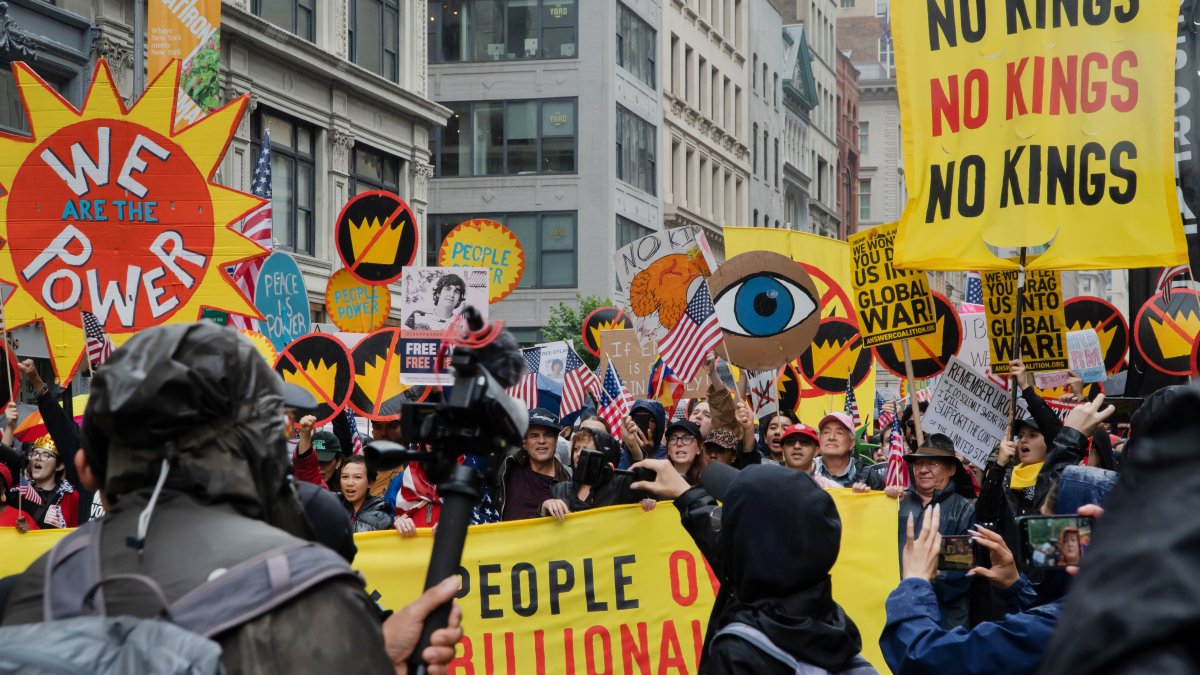“No Kings Day” protests are planned in New York City and across the country this weekend in opposition to what some are characterizing as increasingly authoritarian practices by President Donald Trump.
Thousands are expected to attend, especially in America’s largest cities. The main event in Manhattan is expected to start in Times Square’s Father Duffy Square, starting at 11 a.m. Another big one is planned for Brooklyn. Those interested may learn more here.
It’s the second “No Kings” protest and third mass movement against the administration this year, and it comes amid an https://www.nbcnewyork.com/new-york-city/photos-no-kings-protests-take-place-in-ny-nj-and-ct/6302945/ between federal law enforcement and protesters nationwide.
Some conservative politicians have condemned the protests as “Hate America” rallies, while others say they represent a “patriotic” fight for First Amendment rights.
Here is what to expect on Saturday.
Organizers aim to boost political engagement
Ezra Levin, a leading organizer of Saturday’s protests, said the demonstrations are a response to what he called Trump’s “crackdown on First Amendment rights.”
Levin, the co-executive director of the nonprofit Indivisible, pointed to Trump’s sweeping immigration crackdown, his unprecedented promises to use federal power to influence midterm elections, restrictions on press freedom and retribution against political opponents.
He said those steps cumulatively represented a direct threat to constitutionally protected rights.
Protests are planned for more than 2,500 locations nationwide — from the country’s largest city, New York, to small unincorporated, rural communities like East Glacier Ridge, Montana, with roughly 300 residents.
Organizers will consider the day a success, Levin said, if people are galvanized to become more politically involved on an ongoing basis.
Mostly peaceful protest in June
The last “No Kings” protest took place on June 14 in thousands of cities and towns across the country, in large part to protest a military parade in Washington that marked the Army’s 250th anniversary and coincided with Trump’s birthday. “No Kings” organizers at the time called the parade “coronation” that was symbolic of what they characterized as Trump’s growing authoritarian overreach.
Confrontations were isolated and the protests were largely peaceful.
Crackdown on protests
Trump’s crackdown against protests, especially in Democratic cities, has intensified since the June marches. He has since sent National Guard troops to Washington, D.C., and Memphis, Tenn. His efforts to deploy troops to Chicago and Portland, Oregon, have stalled in federal court.
He has threatened to send them to New York City.
Federal immigration agents have arrested more than 1,000 people in Chicago, the nation’s third-largest city, with increasingly aggressive tactics since September. Protests have been frequent and well attended in recent weeks, and have boiled over in intense clashes outside a suburban federal immigration processing center.
“People are angrier. It feels so much more immediate,” said Denise Poloyac with Indivisible Chicago. “They’re very concerned about what’s happening in Chicago and around the country.”
The “No Kings” organizers have led numerous virtual safety trainings leading up to the protests with the help of the American Civil Liberties Union, which is listed as an official partner on the “No Kings” website.
The trainings informed viewers about their rights during protests — such as whether you are required to carry ID or if wearing a mask is allowed (both vary according to each state) — and emphasized de-escalation techniques for encounters with law enforcement.
Each official protest has a safety plan, which includes designated medics and emergency meeting spots.
Contributing to this report were Associated Press writers Hannah Schoenbaum in Salt Lake City; Christopher Weber in Los Angeles; Juan A. Lozano in Houston, Texas; Terry Chea in San Francisco; and Sophia Tareen in Chicago.

